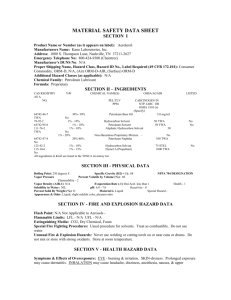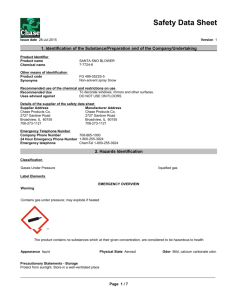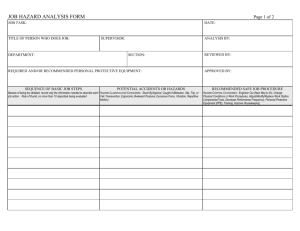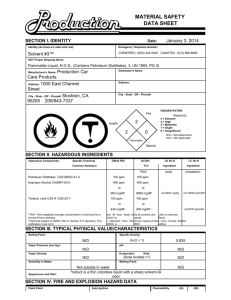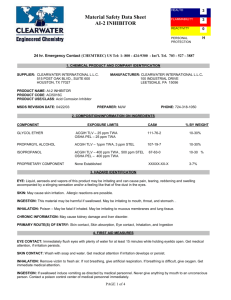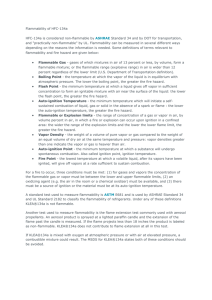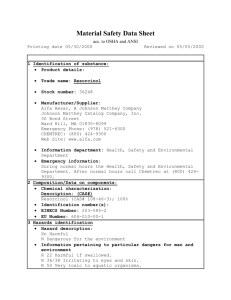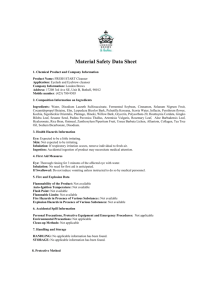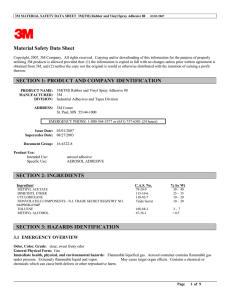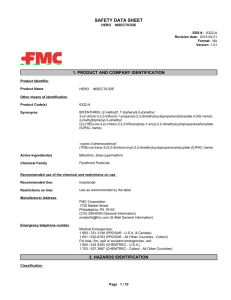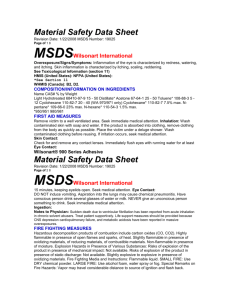PROPANE_(3400)
advertisement
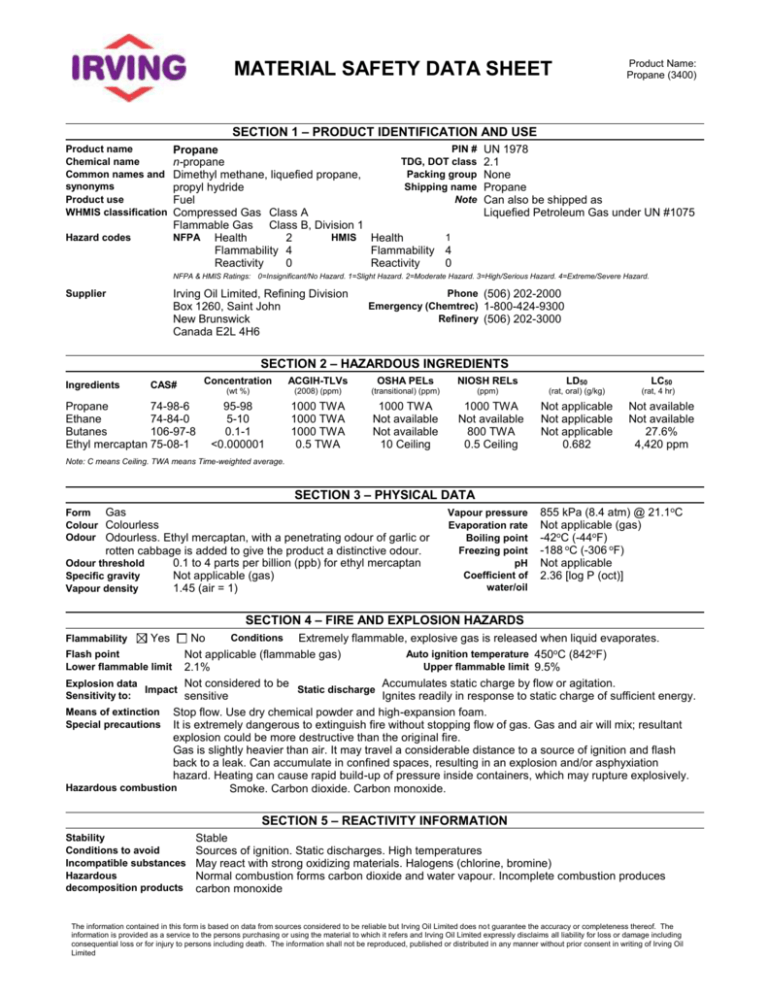
Product Name: Propane (3400) MATERIAL SAFETY DATA SHEET SECTION 1 – PRODUCT IDENTIFICATION AND USE Product name Chemical name Common names and synonyms Product use WHMIS classification Hazard codes PIN # Propane TDG, DOT class n-propane Packing group Dimethyl methane, liquefied propane, Shipping name propyl hydride Note Fuel Compressed Gas Class A Flammable Gas Class B, Division 1 1 NFPA Health HMIS Health 2 Flammability 4 Flammability 4 Reactivity 0 Reactivity 0 UN 1978 2.1 None Propane Can also be shipped as Liquefied Petroleum Gas under UN #1075 NFPA & HMIS Ratings: 0=Insignificant/No Hazard. 1=Slight Hazard. 2=Moderate Hazard. 3=High/Serious Hazard. 4=Extreme/Severe Hazard. Irving Oil Limited, Refining Division Box 1260, Saint John New Brunswick Canada E2L 4H6 Supplier Phone (506) 202-2000 Emergency (Chemtrec) 1-800-424-9300 Refinery (506) 202-3000 SECTION 2 – HAZARDOUS INGREDIENTS Ingredients CAS# Propane 74-98-6 Ethane 74-84-0 Butanes 106-97-8 Ethyl mercaptan 75-08-1 Concentration ACGIH-TLVs OSHA PELs NIOSH RELs LD50 (wt %) (2008) (ppm) (transitional) (ppm) (ppm) (rat, oral) (g/kg) 95-98 5-10 0.1-1 <0.000001 1000 TWA 1000 TWA 1000 TWA 0.5 TWA 1000 TWA Not available Not available 10 Ceiling 1000 TWA Not available 800 TWA 0.5 Ceiling Not applicable Not applicable Not applicable 0.682 LC50 (rat, 4 hr) Not available Not available 27.6% 4,420 ppm Note: C means Ceiling. TWA means Time-weighted average. SECTION 3 – PHYSICAL DATA Form Gas Colour Colourless Odour Odourless. Ethyl mercaptan, with a penetrating odour of garlic or rotten cabbage is added to give the product a distinctive odour. 0.1 to 4 parts per billion (ppb) for ethyl mercaptan Not applicable (gas) 1.45 (air = 1) Odour threshold Specific gravity Vapour density Vapour pressure Evaporation rate Boiling point Freezing point pH Coefficient of water/oil distribution 855 kPa (8.4 atm) @ 21.1oC Not applicable (gas) -42oC (-44oF) -188 oC (-306 oF) Not applicable 2.36 [log P (oct)] SECTION 4 – FIRE AND EXPLOSION HAZARDS Conditions Extremely flammable, explosive gas is released when liquid evaporates. No Flash point Auto ignition temperature 450oC (842oF) Not applicable (flammable gas) Lower flammable limit 2.1% Upper flammable limit 9.5% Explosion data Not considered to be Accumulates static charge by flow or agitation. Impact Static discharge Sensitivity to: sensitive Ignites readily in response to static charge of sufficient energy. Means of extinction Stop flow. Use dry chemical powder and high-expansion foam. Special precautions It is extremely dangerous to extinguish fire without stopping flow of gas. Gas and air will mix; resultant explosion could be more destructive than the original fire. Gas is slightly heavier than air. It may travel a considerable distance to a source of ignition and flash back to a leak. Can accumulate in confined spaces, resulting in an explosion and/or asphyxiation hazard. Heating can cause rapid build-up of pressure inside containers, which may rupture explosively. Hazardous combustion Smoke. Carbon dioxide. Carbon monoxide. Flammability Yes products SECTION 5 – REACTIVITY INFORMATION Stability Conditions to avoid Incompatible substances Hazardous decomposition products Stable Sources of ignition. Static discharges. High temperatures May react with strong oxidizing materials. Halogens (chlorine, bromine) Normal combustion forms carbon dioxide and water vapour. Incomplete combustion produces carbon monoxide The information contained in this form is based on data from sources considered to be reliable but Irving Oil Limited does not guarantee the accuracy or completeness thereof. The information is provided as a service to the persons purchasing or using the material to which it refers and Irving Oil Limited expressly disclaims all liability for loss or damage including consequential loss or for injury to persons including death. The information shall not be reproduced, published or distributed in any manner without prior consent in writing of Irving Oil Limited MATERIAL SAFETY DATA SHEET Product Name: Propane (3400) SECTION 6 – HEALTH HAZARD INFORMATION Route of Entry Inhalation Ingestion Skin absorption Hazardous Contact (with liquid form) Eye Skin Contact with liquid will cause freeze injury to eyes or skin. High gas concentrations (% range) can cause asphyxiation by displacing air and thereby reducing the oxygen available for breathing. Symptoms include rapid breathing, fatigue, incoordination, headache, nausea, vomiting and disorientation. Oxygen concentrations in work spaces must not be permitted to fall below 19.5%. Cardiac sensitization: Heartbeat irregularities in the presence of adrenalin. Very high concentrations (10,000 ppm or more) can cause central nervous system (CNS) depression with symptoms such as headache, nausea, dizziness, drowsiness and confusion. Chronic exposure Not known to cause chronic effects Carcinogenicity Mutagenicity Not known to be mutagenic Not known to cause cancer. Not identified Irritancy Does not cause irritation by ACGIH, IARC, NTP, or OSHA as a Sensitization Weak cardiac sensitizer carcinogen. Teratogenicity Reproductive toxicity Not known to cause reproductive effects Not available Toxicologically synergistic products Simple asphyxiants (chemicals that displace air in confined spaces) are expected to produce additive effects. Acute exposure SECTION 7 – FIRST AID Inhalation Move affected person to fresh air or remove source of contamination. Give artificial respiration if breathing has Ingestion Eye Skin stopped and if a qualified AR administrator is available. Get medical help immediately. Gases do not enter the body by this route. Flush eye with lukewarm, gently flowing fresh water until product is removed. Do not attempt to re-warm. Cover both eyes with sterile dressing. Do not permit affected person to drink alcohol or smoke. Quickly transport affected person to an emergency medical facility. Briefly flush the affected area with lukewarm, gently flowing water until the product is removed. Do not attempt to rewarm the affected area. Do not rub the affected area or apply dry heat. Carefully cut around clothing that sticks to the skin and remove the remainder of the garment. Loosely cover the affected area with a sterile dressing. Do not permit affected person to drink alcohol or smoke. Quickly transport affected person to an emergency medical facility. SECTION 8 – PRECAUTIONARY MEASURES Personal Protective Equipment Gloves Insulated; preferably neoprene, nitrile, or Tychem™ Responder™ Eye Chemical safety glasses with face shield for working with the liquid product. Respiratory NIOSH-approved SCBA or air line respirator with escape cylinder for work in confined spaces where oxygen deficiency may occur. A qualified occupational health and safety professional should be consulted for advice on respirator selection. Clothing & footwear Impervious protective clothing for total skin coverage when working with liquid product. Engineering Enclose product to the greatest extent possible. Use appropriate measures to ensure that oxygen controls concentrations do not fall below 19.5%. Handling Eliminate all ignition sources. Use non-sparking equipment, explosion-proof ventilation systems, and procedures & intrinsically safe electrical equipment. Bond and ground containers during product transfer. Have clean equipment emergency eyewash and shower readily available in the work area. Leak & spill Evacuate area and keep it isolated until all gas has dispersed. Eliminate all sources of ignition. Ventilate procedure area. Stop leak if it can be done safely. Water spray may be used to dissipate gas. Waste disposal Consult local authorities. Controlled release to air may be permitted in certain situations. Storage Store in a cool, well-ventilated area. Keep away from strong oxidizing materials, excessive heat, and sources of ignition. Use non-sparking equipment and explosion-proof ventilation systems. Consider leak detection and alarm equipment for storage area. Shipping Bond and ground containers for transfer. SECTION 9 – PREPARATION DATE OF MSDS Prepared by Revision date D. Smith for Irving Oil Refinery November 19, 2008 Phone (506) 202-3000 To re-order MSDS, (506) 202-2000 phone The information contained in this form is based on data from sources considered to be reliable but Irving Oil Limited does not guarantee the accuracy or completeness thereof. The information is provided as a service to the persons purchasing or using the material to which it refers and Irving Oil Limited expressly disclaims all liability for loss or damage including consequential loss or for injury to persons including death. The information shall not be reproduced, published or distributed in any manner without prior consent in writing of Irving Oil Limited
